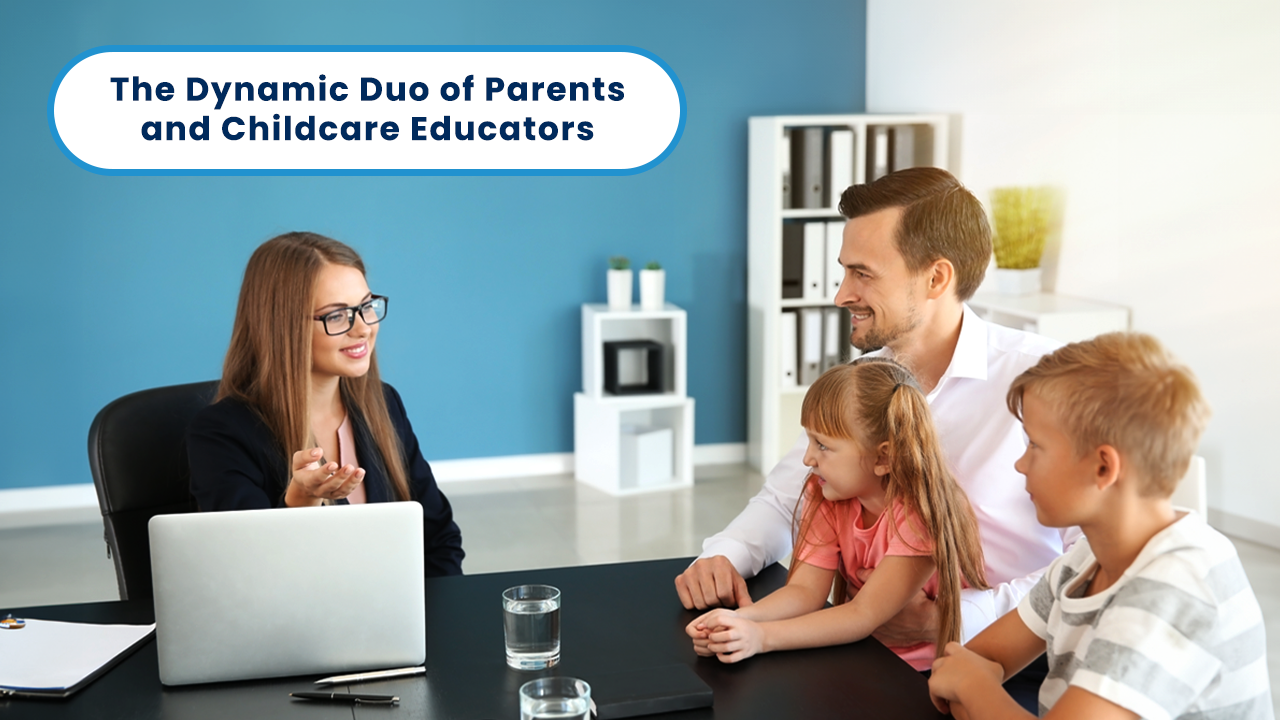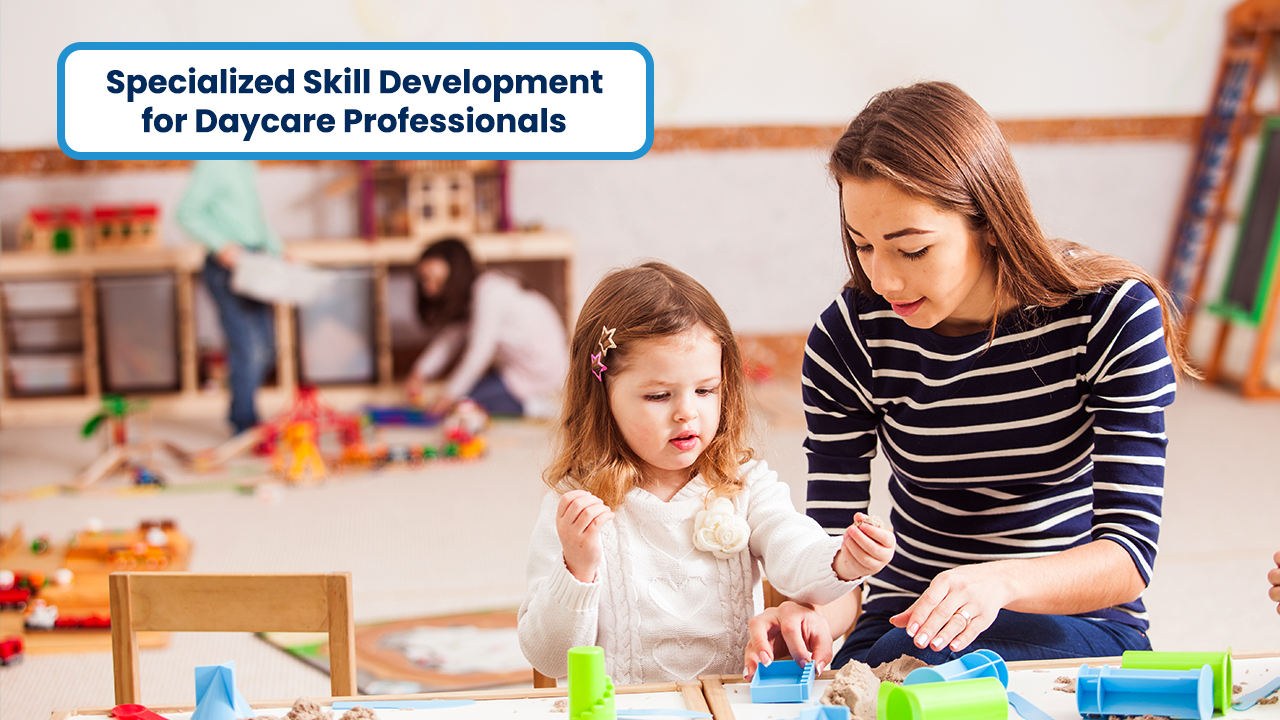
In the fascinating world of early childhood education, there’s a synergy that’s as potent as any superhero team—parents and childcare educators. When both entities come together, they form an indomitable alliance that ensures a child’s growth, development, and overall well-being. For most parents, entrusting their precious child to an educator for several hours daily is a significant step. This trust is cemented when they feel confident about the competence and dedication of these educators. Conversely, for childcare professionals, having engaged and supportive parents can make a huge difference in how effectively they can educate and care for each child. The dynamics between parents and educators are crucial, and recognizing this partnership’s potential is vital for a child’s holistic development.
The Benefits of Building The Duo of Parents and Childcare Educators:
Enhanced Trust and Confidence:
A strong relationship fosters mutual trust. Parents feel secure knowing their child is in capable hands, while educators appreciate the trust placed in them.
Optimized Learning Environment:
Collaboration between parents and educators ensures that a child’s needs are recognized and addressed, leading to a more tailored and efficient learning experience.
Holistic Child Development:
Both parties can share insights and observations about the child’s behavior, enabling a comprehensive understanding and strategy for addressing various developmental aspects.
Consistency in Care:
When educators and parents are on the same page, it provides consistency in teaching and discipline strategies, creating a stable environment for the child.
Emotional Support System:
Children feel more secure and supported when they observe unity and cooperation between their home and educational environments.
Feedback Loop Creation:
Regular communication allows for feedback from both sides. Parents gain insights into their child’s educational growth, while educators learn about the child’s home environment and any potential factors affecting their behaviour or learning.
Community Building:
A strong bond between parents and childcare centers creates a sense of community, fostering a supportive network and a sense of belonging for families.
Better problem-solving:
When challenges arise, a cooperative relationship between parents and educators ensures a quicker and more effective resolution, benefiting the child’s well-being.
Increased Engagement:
Parents with a strong relationship with childcare centers are likelier to engage in school activities, volunteer, or participate in events, enriching the educational environment.
Promotion of Lifelong Learning:
The combined efforts of parents and educators can instill a love for learning in children, emphasizing its importance both inside and outside the classroom.
In essence, building a relationship between parents and childcare centers is pivotal for ensuring not just the child’s academic success but also their emotional, psychological, and social well-being.
Top Strategies to Promote The Duo of Parents and Childcare Educators
Promoting the duo of parents and childcare educators is essential to ensuring a cohesive, effective, and nurturing environment for children. Here are some top strategies to promote this dynamic duo:
Collaborative Workshops:
Organize joint workshops where parents and educators can share insights, address concerns, and develop collaborative strategies.
Open Communication Channels:
Establish dedicated communication platforms, like messaging apps or email newsletters, where updates, progress, and feedback are regularly shared.
Parent-Educator Meetings:
Regularly scheduled one-on-one or group meetings can foster mutual understanding and build strong relationships.
Joint Events:
Organize events where parents and educators can come together in a casual setting, like picnics or themed days, to foster camaraderie.
Training & Development:
Offer joint training sessions for parents and educators on child development, behavioral strategies, and other relevant topics.
Shared Resources:
Create a resource library or online portal where both parents and educators can access useful materials, articles, and best practices.
Feedback Mechanism:
Implement a structured feedback system where both parties can provide input on what’s working and what can be improved.
Recognition and Appreciation:
Celebrate successes and milestones achieved by the child, appreciating both the parents and educators for their roles in the achievement.
Community Engagement:
Engage the broader community to understand the importance of the parent-educator relationship, possibly through community fairs, local media features, or guest speaker events.
Inclusion in Decision-Making:
Actively involve parents in major decisions regarding curriculum changes, event planning, or any other significant childcare development.
Shared Goals and Vision:
Work together to develop a shared vision or mission statement that underscores the importance of collaboration between parents and educators for the child’s best interests. Read More about the Challenges facing preschool teachers
Promoting the partnership between parents and childcare educators ensures a supportive environment for children and creates a community of trust and shared responsibility. By implementing these strategies, both parties can work together more effectively for the betterment of the children they serve.
The Role of Technology In Strengthening the Duo of Parents and Childcare Educators
In the evolving childcare landscape, the relationship between parents and educators is paramount. The use of technology, particularly software like 360Daycare, is revolutionizing this partnership, ensuring that the dynamic duo operates more cohesively and effectively than ever.
1. Enhanced Communication:
360Daycare software offers platforms for regular updates and communication. This ensures parents are kept in the loop about their child’s day, developmental milestones, and any concerns or achievements. Educators can share photos, updates, and daily reports, making parents feel connected, even when they are away from their children.
2. Digital Portfolios:
Children’s developmental progress can be tracked and presented in a digital format. Parents can see their child’s growth, artwork, and achievements at a glance, creating a sense of pride and involvement.
3. Scheduling and Events:
With the 360Daycare software, events, parent-teacher conferences, and special days can be scheduled with ease. Parents can get reminders, ensuring they never miss an important date.
4. Feedback and Surveys:
The software allows for easy feedback mechanisms. Parents can voice their concerns, give suggestions, and provide input, making them active participants in their child’s education.
5. Transparent Billing:
Financial aspects, such as fee payments, can be handled transparently, ensuring clarity and trust between the institution and parents.
6. Resource Sharing:
Educators can share valuable resources with parents, from articles about child development to fun activities they can do at home. This fosters a sense of community and collaborative growth.
7. Security and Peace of Mind:
Knowing that their child’s data is secure and that they can check in digitally provides parents with added peace of mind. Features like digital check-ins and real-time updates further enhance trust.
In essence, technology and the capabilities offered by 360Daycare software bridge the gap between parents and educators. It fosters a partnership rooted in transparency, trust, and a shared goal of nurturing the child’s growth and development.


